

 Pedro Marín has never really been far from the sea. He got used to fishing to provide for his family ever since he was a teenager. One day in 2015, while on one of his fishing trips or faenas, he had to face more than a few obstacles that would confront him with his most deeply rooted fears.
Pedro Marín has never really been far from the sea. He got used to fishing to provide for his family ever since he was a teenager. One day in 2015, while on one of his fishing trips or faenas, he had to face more than a few obstacles that would confront him with his most deeply rooted fears.

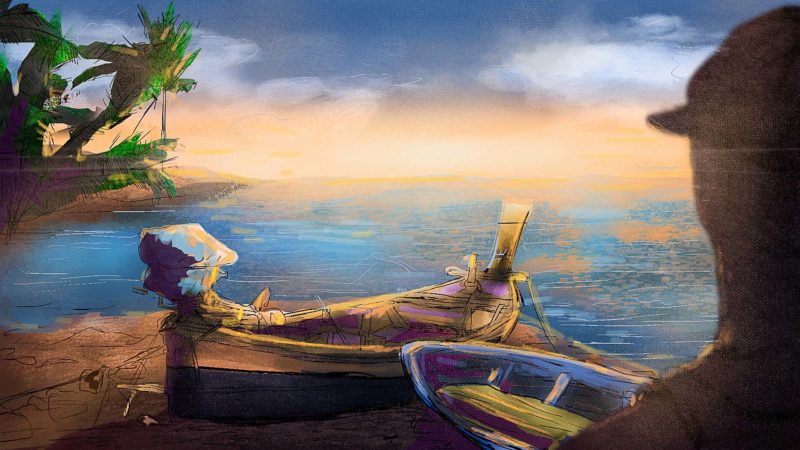 Image Credit: Robert Dugarte
Image Credit: Robert Dugarte
The fisherman Pedro Marín had just been shrouded in thick darkness, in the middle of the sea, most of his body underwater. He was near the coast of Cumaná, in the state of Sucre, east of Venezuela, at the mercy of the waves that were hitting him hard.
“Oh my god! I’m going to get lost here! I will not see my children again!”
It had been a bumpy ride from the very beginning. But he was used to the fury of the seas and it never crossed his mind that things would get worse by the minute and that he would end up facing one of his most deeply rooted fears: that he will die and that his body would never be found.
It saddened him to think about his family.
Pedro had grown an interest in fishing since he was 13. He was not much into studying and he had thought of dropping out of school at that early age. Besides, it was him who put food on the table for his sisters and his mother because his father, who was a fisherman, was often away on faenas or fishing trips of five months or so to Suriname, where he would sell the products he got from the sea. So, in the meantime, it was Pedro who played the breadwinner.
Pedro started fishing near the coast of their hometown island of Margarita. He would soon quit school altogether. During an argument with his father, he told him that he too wanted to make fishing his sole occupation.
At the age of 14, he went deep-sea fishing —a type of fishing that is typically carried out far from the coast and presents great dangers to fishermen— with his father and brothers. That is how he got to the coast of Paria, in the state of Sucre. It all went smooth that first time on the high seas: he did not vomit, he did not get seasick, and the people on the boat treated him like a seasoned sailor. Eventually, he would become a fishing expert.
That was almost 21 years ago. Ever since that day, Pedro has never been far from the sea. He grew up, got married, and had two children whom he built a small house for near the Macanao peninsula, on the island of Margarita. He still goes out on faenas because he has to provide for his family. The bad weather or the rip currents and rough surf are not an excuse anymore for him to stay home.
Like those of that day in 2015, when he was already 35.
He had no choice but to take to the sea with his brothers, even though Ismael, his father, was gravely ill. Fishing was the only way he could help him with his medical treatment.
It was mid-January and they had been sailing for several days. At one point, they were anchored in El Morro de Puerto Santo, near Carúpano, east of Venezuela, waiting for some supplies from one of the heads of the fishing company. It was a routine stop that they made the day before they went actually fishing. Back then, the stories of armed pirates robbing ships were not that frequent, perhaps because it was not such a big issue at the time.
The fishermen and crew fell asleep around midnight. Suddenly, Pedro was woken up by a heavy blow to his forehead with an iron tool. The first thing he saw was a hooded man dressed in a shirt pointing a 38-caliber revolver at him. He thought he was dreaming, but then he saw another man pointing a shotgun at the ship’s captain. As the other fisherman woke up, the hooded pirates shouted: “Don’t move!”, as a warning that they were being robbed.
“Do not scream, I will shoot you if you do!”
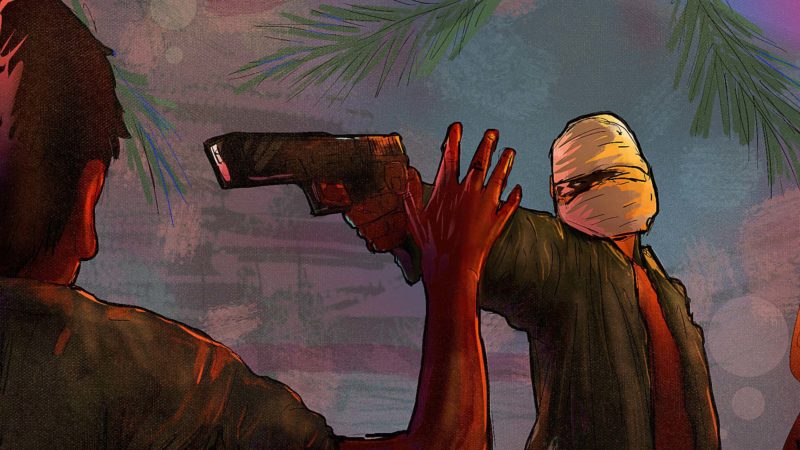
While the others thugs took all they could from the boat, including money, radio transmitters, fishing equipment, and food, the fishermen noticed that one of the robbers, who was standing guard over them, had a burn scar on the neck. They also looked at the weapons and paid attention to the men’s threatening voices.
Out of the blue, the thieves began to argue and scream at each other. The youngest one, who was obviously altered, perhaps under the influence of drugs, threatened Kevin —one of the six fishermen in the boat with Pedro— with severing his head with an axe.
“C’mon, let’s kill him!” he repeated again and again.
“Chill out, man; take it easy; we are almost done here,” warned the man who looked like the leader of the pirates.
In the middle of the altercation, they blurted out a name and a nickname: “Luis” and “El Negro”.
After a few hours that seemed like forever, the thieves managed to escape. It was about 3:00 a.m. Pedro and his mates would have to wait until dawn to see if they could recover what had been stolen from them. After all, it was a small town and everyone knew everyone. Maybe the names they had heard would serve as a hint and someone might know something about the criminals. Or so they thought.
In the morning, they decided to talk to some friends they had at the port. They told them what they knew. One of them was the nephew of a well-known mobster, a mafioso, in the area. In Paria, the mobsters are powerful men who impose their own systems of control and justice: nothing happens on their grounds without their consent. A robbery like that was a gross disrespect for the authority of the mob boss in question. And he will not put up with it.
“Are you sure it’s him? If it’s him, I’ll bring him to you, but if it’s not him, you’ll have to deal with me,” said the outlaw when they met face to face. Even though it had been three months since El Negro had been released from jail, they had to be sure that they were accusing the right person, because the man who was helping them did not want to execute an innocent man: it would affect his reputation and upset the people in the area.
The fishermen were increasingly worried. They knew that the situation could get more complicated for them. They told him that they needed to see the men to make sure it was they and dispel any doubts.
Pedro, his mates and the mobster found Luis in “La cueva del conejo”, a town joint. As one would have expected, the man denied having taken part in a robbery. The fishermen had no way of verifying his involvement because he had his face covered the entire time. But, after a while, another man appeared who was one of Luis’s partners and whom they recognized by the burn scar on the neck.
The mob boss and his men managed to catch five of the six robbers; the leader, a.k.a. “El Negro,” escaped. While they were waiting for the National Guard officers to arrive, the mafioso was beating the crap out of the thieves inside a hut near the beach. They were screaming and begging for mercy. Finally, they admitted to what they had done. Pedro and the other fishermen recovered all their stolen items, which they had to dig up with the help of the mob boss’s men in a neighborhood called El Mosquito.
Because they needed to resume their fishing as soon as possible, and knowing that it would take a long time to process a complaint, the captain and the fishermen decided not to file one formally with the Prosecutor’s Office.
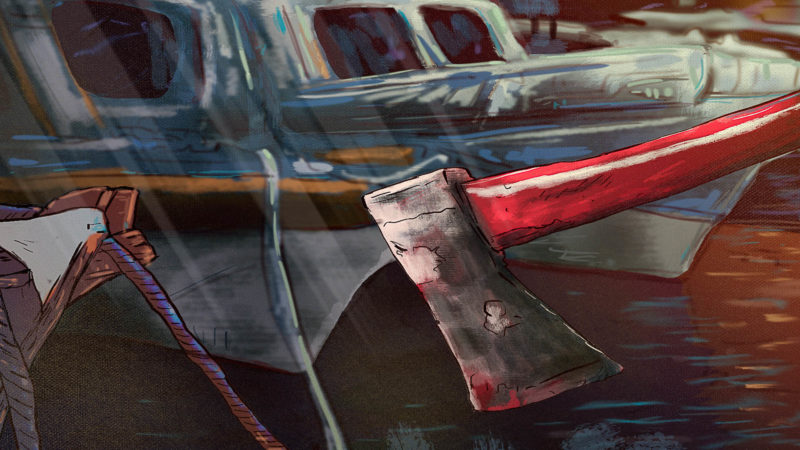
The next day, at dusk, they left; the sun was going down as they said goodbye to El Morro in Puerto Santo. They were on their way to the fishing area. The storm was bad; the waves were rapidly rocking the boat up and down. But they continued their trip despite the weather. It was a moonless night.
Pedro was standing guard with another boat mate. It was about 10:00 p.m. and the others were asleep; suddenly, they heard the sound of a 200-liter drum getting loose at the top of the boat. It had not been secured properly, for sure, and the heavy shaking of the sea had untied it.
“How are we going to tie the drum back on?” asked his mate.
“How are we going to what?! Can’t you see how rough the sea is?! It is really crazy out there…” answered Pedro.
The man insisted that they tied it up. Pedro, on the other hand, would rather let the drum go into the water. Even so, he began to help his friend with the task.
They decided to fix the drum to one of the sides of the boat. Pedro’s fishing partner held the drum in place while he tried to tie it up, pressed by the force of the waves and the speed of the boat. They strived to do it as quickly as possible because they were aware of the danger they were exposing themselves to.
Suddenly, a wave hit them hard.
Pedro had one hand on the rope and the other hand on the boat. The rough pounding of the wave made the rope partially slip out of his hand. His mate grabbed hold of a stanchion (one of the beams that support the roof of the boat), but Pedro fell off, screaming:
“I fell into the water! I fell into the water! I fell into the water!”
As he was still holding onto the rope, the boat was dragging him at a speed of 8 miles per hour. The waves were hitting him harder and harder. Whoever was driving the boat at that hour had no idea about what was going on. The force of the waves and the sound of the engine would not allow the rest of the men to hear what was happening.
The pulling strength of the rope made cuts on Pedro’s wrist and biceps. He was in excruciating pain, so he decided to let go of it… His brother, who was also on the boat, got up at the change of shift and saw Pedro’s partner banging on the cabin to warn them, and that is when he realized what was happening; he rushed back and quickly managed to stop the boat.
Pedro’s guess is that the distance between his body and the boat was about 40 meters; 40 meters seems like a short distance, but in the middle of the night, where you cannot see beyond three feet, it seemed endless. He was underwater and all he could see was a small light in the boat; he was terrified that he could disappear into the sea and that he could never see his family again.
Only then did he begin to fear for his own life.
“Oh my god! I’m going to get lost here! I will not see my children again!”
He had a thousand thoughts, but leaving his children orphaned and without means was the one that tormented him the most.
The captain, who had also been sleeping, got on his feet and quickly checked the boat’s navigation history on the GPS. They went back looking for Pedro, but it was so dark that all they could do was shout. The strong sea storm and the sweeping of the waves had made Pedro feel that his attempts to swim were useless.
He had already been in the water for an hour; he was well aware of the stories about fishermen who had gone missing even in daylight. His anxiety about it was growing, so he began to swim with all his might, as tired as he was. The boat was slowly approaching; it was just about 50 feet away… And they finally heard him crying out!
It was so dark that the boat was getting near but they could not spot him, at least not until Pedro shouted at them to stop the boat so that he could swim to where they were instead.
Pedro swam until he has used up all his strength.
With no energy left in him, he finally made it. The other fishermen helped him into the boat. He had no pants on; feeling that he was on the verge of fainting, he threw himself on the floor.
He was worn out, very cold, and he had wounds in his arms, but he was alive, inside the boat, and certain that he would return to his family. He had been born again for the second time in two days. And that was enough for him to feel lucky.
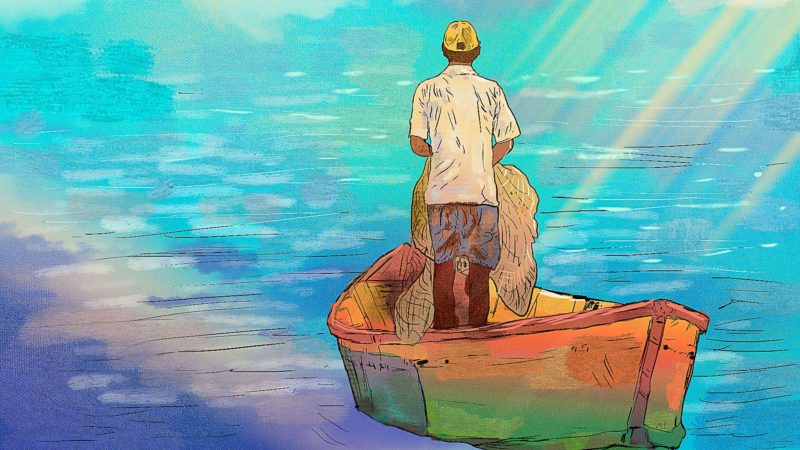
* The names of the characters have been changed.
Translation: Yazmine Livinalli
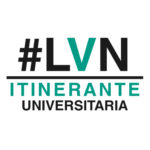 This story was produced within the framework of the La Vida de Nos Itinerante Universitaria program,
This story was produced within the framework of the La Vida de Nos Itinerante Universitaria program, 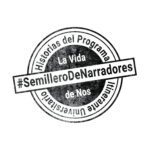 which offers workshops on real-life storytelling for university students and professors from 16 Social Communication schools in seven Venezuelan states.
which offers workshops on real-life storytelling for university students and professors from 16 Social Communication schools in seven Venezuelan states.

1779 readings
I was born in 1998 in Guayana. The Andrés Bello Catholic University and its people changed my life. I used to be into soccer, but now I am passionate about researching and writing stories that can make us more human as citizens. Love and control. #SemilleroDeNarradores [Seedbed of Storytellers].
Un Comentario sobre;